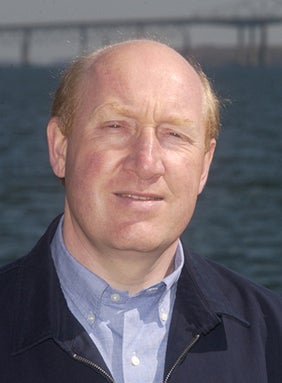KINGSTON, R.I.—March 28, 2017—The temperature of the ocean is the most important factor in forecasting hurricane intensity.
Scientists were largely unaware of this fact—until University of Rhode Island oceanographer Isaac Ginis discovered the crucial role the ocean plays in the path and power of hurricanes.
Ginis has received many honors for his decades of research, with the latest award from the National Oceanic and Atmospheric Administration, or NOAA.
At the Tropical Cyclone Operations and Research Forum March 16, he received a certificate of appreciation from the federal organization for his contributions to hurricane forecasting.
Ginis, a native of Russia, doesn’t sail or fly into hurricanes to study them. His groundbreaking research has been accomplished sitting at a computer.
With a bachelor’s degree in math and a doctorate in geophysics—both from Russian institutions—Ginis creates mathematical computer models to track storms and predict their strength.
His expertise is sought out by public and state officials—including those in Rhode Island—trying to discern when, and if, a hurricane will make landfall. Ginis’ insight is critical; his models give officials time to prepare for a storm and save lives.
URI’s Department of Marketing and Communications talked to Ginis recently about his research, and whether climate change will bring more storms to the Northeast.
How did you get interested in studying hurricanes?
I became interested in hurricanes when I took physics in high school and was lucky to get the opportunity to study them as part of my doctorate thesis research. I wanted to better understand the physical processes that control a hurricane’s behavior so we can better predict what the storm is going to do tomorrow or in the next few days.
You are the first scientist to show the ocean’s role in hurricane intensity. Can you explain your discovery?
From a physics standpoint, a hurricane is a heat engine. It’s a massive natural machine for converting heat energy into mechanical energy—in this case wind. That heat energy is derived from the ocean. Recognizing this relationship between the ocean and the atmosphere allowed us to build computer models that can more accurately predict the strength of hurricanes. But hurricanes are complex, and there are many ingredients in the recipe for any given storm.
If you don’t fly into a hurricane, how do you get your data?
We have many observational platforms these days to gather data in the atmosphere and ocean that help predict hurricanes. Most important, of course, are the measurements made by reconnaissance aircraft. In their absence, satellites are the primary platform for hurricane observations, but critical measurements are also taken at sea by ships and buoys and on land by radars and other coastal monitoring systems.
As temperatures increase due to climate change, do you expect more frequent and intense hurricanes in the Northeast?
Recent scientific evidence and modeling studies suggest that hurricane intensity may be increasing and will continue to increase due to warmer sea-surface temperature, but the connection to Atlantic hurricane frequency is less conclusive. In addition to intensity, models project significant increase in rainfall that will lead to inland flooding during hurricanes.
What about other regions of the world? How do you help predict hurricanes elsewhere?
The computer models our URI hurricane research group helps to develop and improve are used by NOAA’s National Hurricane Center and the Navy’s Joint Typhoon Warning Center worldwide.
For example, our models were involved in forecasting Typhoon Haiyan in the Northwest Pacific, the strongest tropical cyclone recorded at landfall, which devastated the Philippines in 2013.
Have you ever been in a hurricane?
Although I never experienced a hurricane personally, I was involved in surveying the damage after Hurricane Katrina in 2005. The devastation inflicted by that storm on the Gulf Coast is still vivid in my memory.
In Biloxi, Miss., I saw houses destroyed by the storm surge with only a few items left on the ground and large casino barges severely damaged and pushed on shore. Those images made me appreciate even more the enormous destructive power of a hurricane.
What advice do you have for students who want to study hurricanes? Is it more important to study math or physical oceanography—or both?
Weather and hurricane forecasting is a combination of physics, mathematics and computer science. I suggest studying all of these subjects in college.

